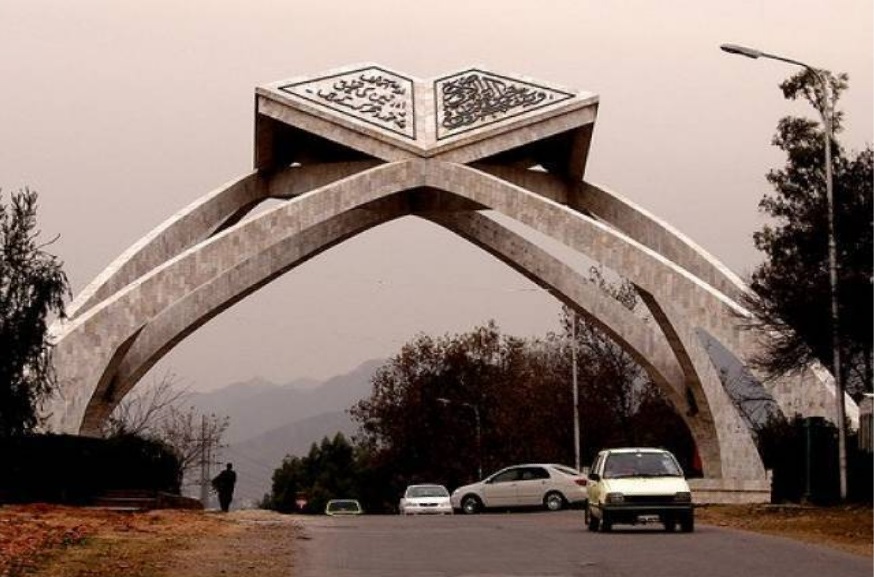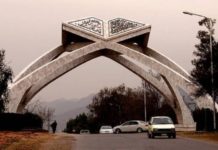Defenders of Pakistan’s premier public university are fighting a desperate battle to save its land, a fight for the very soul of Pakistan. At stake is survival of the country’s only federal university. Still more importantly, this battle’s outcome will spotlight national priorities.
Should education institutions be sacrificed for building roads or residences for politicians? Can public resistance overwhelm the greed of land grabbers and corrupt officials? The weeks ahead will tell.
For a full month, bulldozers had freely rampaged through Quaid-e-Azam University, uprooting hundreds of carefully planted and nurtured trees. They were preparing the ground for a 76-metre wide Islamabad-Murree highway passing through the university.
Temporarily an order of the Islamabad High Court has stilled these monster machines. Nevertheless, construction work proceeds at breakneck speed at both ends of the campus boundary.
Poor governance, vastly amplified by uncontrolled population growth in the surrounding area, is the core problem. A tiny sleepy settlement on Murree Road called Bharakahu was once just a few hundred people.
Over the years, it has exploded into a disorganised mass of hutments, push carts, shops, and plazas competing for every scrap of land. Unable to bring order to chaos, civic authorities withdrew to a safe distance leaving the law of the jungle to prevail. The chaos spills over onto Murree Road slowing traffic to a crawl.
The obvious solution is to build an elevated highway passing safely over the settlement. In fact, this 3.5-kilometre plan was originally proposed in 2015 by the government. Approved by the Capital Development Authority many years ago — and by the National Highway Authority earlier this year — it is the simplest and cleanest solution.
Seizing a public university’s land for a six-lane highway will bring disgrace, not votes to PML-N.
This sensible plan was shelved ostensibly because Bharakahu’s shop owners didn’t want it. However, the truth goes well beyond this opposition. In fact, the real push for using QAU’s land came from CDA. Shortly after PM Shehbaz Sharif assumed office it initiated the QAU bypass idea and obtained approval from the PM.
But did CDA honestly inform the PM of the project’s consequences and impact? Brief him about the implications of seizing land from a public university for purposes other than education? Tell him that a similar effort in Jhelum was declared illegal by the Supreme Court in May 2009? Was he informed of the knock-down effect upon other institutions? Only insiders can know.
Expectedly, the bypass project has released a swarm of demons. The area’s land grabbers have smelled blood and have begun contracting speculative deals. Like every Pakistani — including the just-released killers of Perween Rahman — they know well that demand for land amidst an exploding population far outstrips availability and prices fly through the roof.
CDA’s project dooms the university because it cunningly splits the university’s land into two non-contiguous, non-communicating parts.
Land grabbers are lusting for the part next to Bharakahu. Largely unbuilt, it has been designated “uninhabited wasteland” by CDA. But, in fact, this land was meant for creation of new departments, hostels, research institutes, a herbarium, botanical garden, and laboratories.
There is excellent reason to fear that the unbuilt part will be stolen. In 2017, the Islamabad High Court had ordered CDA to identify the current boundaries and indicate encroached areas within QAU’s original boundary. Known for shady dealing, CDA has not so far complied — possibly because a new map could hinder persons within this organisation who grant favours for a price. This is an ominous sign.
Even the president of Pakistan, Arif Alvi, seems helpless before the land mafia. As QAU’s chancellor, and therefore bearing ultimately responsibility, he asked the QAU administration weeks ago for clarification. However, the president’s office says a reply is still awaited. This is more than fishy, something stinks!
Today, of the original 1,709 acres allotted to QAU in 1967, less than 1,250 acres currently remain in the university’s control. An estimated 450 acres of university land is presently occupied by encroachers, including a prominent politician. Thanks to CDA’s present initiative, several hundred additional acres are shortly going to be up for grabs.
The bypass project has created deep fears on one side and, equally, expectations of windfall gains on the other. The polarisation is tremendous.
On the one side are defenders of the public good who have vowed to protect the university. These comprise QAU students, teachers, alumni, and civic-minded citizens.
Conspicuously absent are QAU’s vice chancellor and Syndicate members who, for unknown reasons, signed away the university’s future without explanation. The terms of the VC and Syndicate expired this week. All have moved on to greener pastures. How convenient!
On the other side of the divide is a nexus of shop owners, local influentials and property dealers. Many individuals are all three rolled into one. All shop owners, both small and big, oppose the flyover.
Up to a point their opposition is understandable. Getting fair compensation from any government department is never easy and often requires greasing palms. Besides, most cannot show that they actually own the land they occupy.
Push came to shove on Nov 18 at the Convention Centre in Islamabad where a CDA-orchestrated function under the aegis of the Environmental Protection Agency was held. Whereas environmental impact assessments in Pakistan are often mere tokens, this one was breathtakingly brazen.
All 19 individuals interviewed for the project’s environmental impact (a legal requirement) fully supported using QAU land but none was a QAU student, teacher, or alumnus! Although the university’s 300 defenders were outnumbered by a still larger number of noisy hirelings summoned by the area’s property dealers, the EIA was resoundingly exposed as fake.
Fortunately, police presence ensured the event ended without serious injuries. The next day QAU went on strike and shut down. Desperate defenders say they will stand in front of the bulldozers if they move again.
Shall rule of law prevail? Will public property be protected? Can Pakistan’s land mafias be kept in check? In the haste for windfall profits, land grabbers inside and outside the government connive to increase their personal wealth at the expense of public good.
PM Shehbaz Sharif needs to review his decision which, if implemented, will increase the nation’s despondency.









